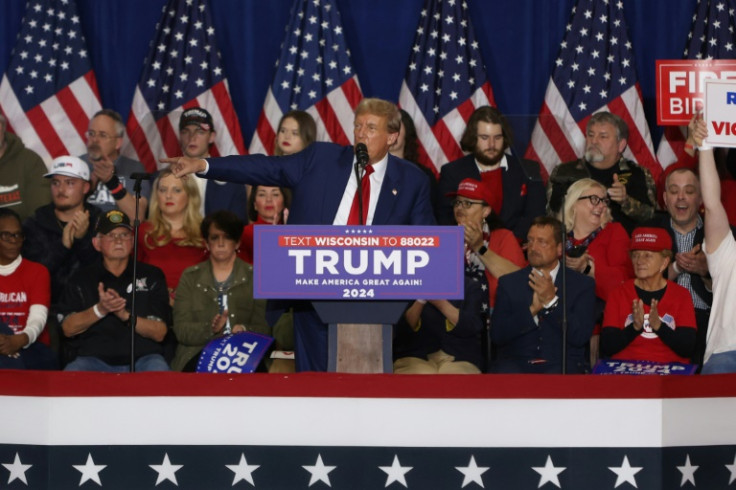Wary Trump Says Up To States To Decide Abortion

Abortion rights should be left up to states to decide, US presidential candidate Donald Trump said Monday, in his latest effort to thread the needle between satisfying his hard-right base and not alienating centrists.
"My view is now that we have abortion where everybody wanted it from a legal standpoint, the states will determine by vote or legislation or perhaps both," the Republican said in a video posted on his Truth Social network.
"And whatever they decide must be the law of the land, in this case, the law of the state."
Trump's November opponent, Democrat President Joe Biden, is a devout Catholic but has firmly supported abortion access, stating repeatedly that if Congress tries to enact a national ban, he will veto it.
Trump did not mention a national abortion ban and did not say whether he would veto an attempt to enact one by a future Republican-led Congress.
But Biden responded with a statement saying Trump is "lying" and, if given the opportunity, would sign a national ban into law.
"Trump is scrambling" to limit the political damage, Biden said. "He is -- more than anyone in America -- responsible for creating the cruelty and the chaos that has enveloped America."
While Trump was hit from the left -- including by the American Civil Liberties Union, which accused him of "trying to hide the ball" on his anti-abortion policies -- he was also under fire from conservatives for not going far enough.
Trump's statement was "a slap in the face to the millions of pro-life Americans who voted for him in 2016 and 2020," said his former vice president, Mike Pence.
Trump has stated often that he is proud of stacking the US Supreme Court with three conservative justices during his presidency, creating a majority to overturn Roe v Wade -- the ruling that had enshrined the federal right to abortion -- in a shock 2022 decision.
But he has also tried to maintain ambiguity to avoid burning political bridges over a ferociously contentious issue.
In February, The New York Times reported that Trump told advisers he favored a 16-week national abortion ban, but was hesitant to address it publicly lest he alienate conservatives who want to ban the procedure.
The head of the anti-abortion Susan B. Anthony group said she was "deeply disappointed" by Trump's stance.
An influential Republican senator, Lindsey Graham, said he also disagreed with Trump's latest positioning, and argued that "there should be a national minimum" of 15 week limits.
The 2022 Supreme Court decision left states to establish their own laws on reproductive rights.
Some Republican-led states have enacted near-total bans and there is a powerful movement in the party to get a national ban.
Democrats have pushed back by winning a series of state-wide referendums on making legal abortion access state law.
Trump's home state of Florida is set to enact a six-week abortion limit but will also have a referendum in November on enshrining access rights in the state constitution.
In his statement, Trump did not mention the Florida ban or how he will vote in November.
A majority of Americans think abortion should be legal in most cases, according to polling, and around half of states have measures in place to protect access.
Trump did not clarify at what number of weeks he himself supported a ban, but repeated that he is "strongly in favor of exceptions for rape, incest and the life of the mother."
He tried to paint Democrats as the "radicals" on the issue, baselessly accusing them of supporting abortion "up to and even beyond the ninth month... and even execution after birth."
Abortions in the third trimester, or after the 26th week of pregnancy, are rare, according to federal data, and only performed by a handful of providers, often for medical reasons.
© Copyright AFP {{Year}}. All rights reserved.




















